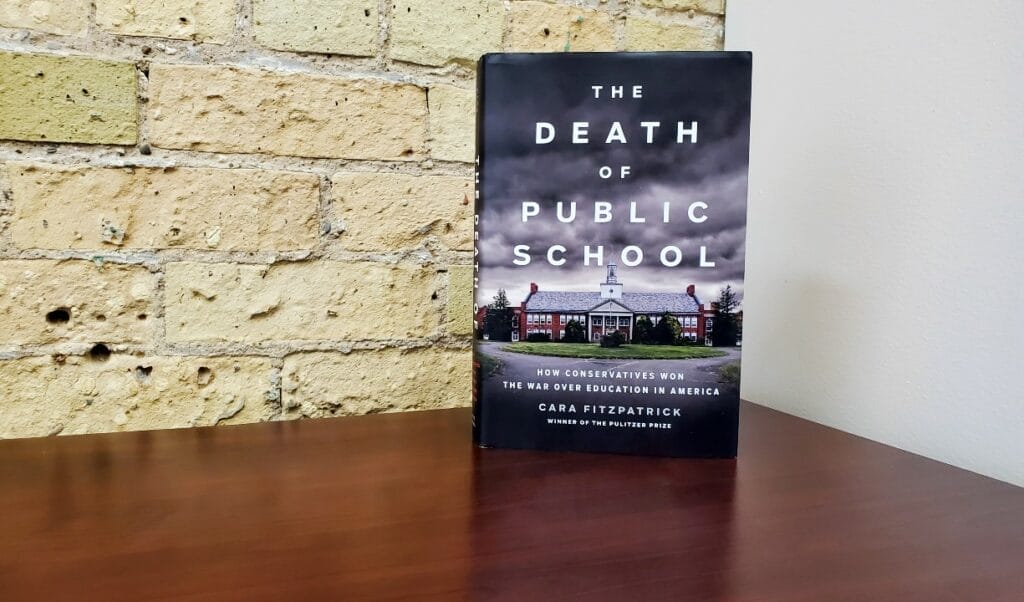America has changed its mind on what public education looks like, thanks to parents who demanded school choice
“The Death of Public School,” proclaimed the title of a widely touted new book, and a Milwaukee crowd came last week to hear the gruesome details.

You should note first that the corpse is missing. Of the 866,000 Wisconsin kids getting a state-funded K-12 education as of this fall, 92.3% get one in a plain old public school, down only a tick from 92.7% last fall. “Death” seems a hysterical overreach.
The author, Cara Fitzpatrick, interviewed on stage, quickly conceded that public schools aren’t dead. Instead, “it’s sort of this war over ideas and definitions,” she told her interlocutor. When her subtitle says, “How conservatives won the war over education in America,” she said, she means that boundaries have been blurred and the definition of “public education” expanded in Americans’ minds. It no longer is only, as she writes, schools that are government-run, tax-paid, answerable to voters and “free of religious instruction.”
“Free of”? One is free of chains or illness. I’d say more accurate words are “deficient in,” “stripped of” or “bereft,” but a neutral “without” would do.
Still, if Americans’ view of schooling really has expanded, I have one thing to say:
Good.
Long time coming
Fitzpatrick’s book is a 70-year history of the effort to give parents without the means to pay both taxes and tuition some say in the form of their children’s schooling. While she spends many pages on the fortunately short-lived attempts in the 1960s South to use vouchers to avoid integration, Milwaukeeans with honest motives figure large in her book.
A Marquette University political scientist and Jesuit, Fr. Virgil Blum, worked from the 1950s onward in urging that state aid follow children to religious schools as a way of preserving First Amendment liberty in a pluralist America. Fitzpatrick extensively chronicles the effort by Milwaukee legislator Polly Williams, who settled on school choice as a way of empowering poor African-American families poorly served by the Milwaukee Public Schools.
It was part of a larger movement since the 1970s, one that linked liberal academics, urban minority parents and libertarian economist Milton Friedman, among others, in demanding that parents be given the power to take their children out of schools that weren’t teaching and to use schools that would try something better. It was legendary teachers’ union leader Albert Shanker, Fitzpatrick reminds readers, who helped invent the idea of charter schools, saying in 1988 that America needed more than “one remedy, one pill, one way of teaching kids.” Two years later, when Milwaukee’s pioneering choice program launched, it was Williams — a liberal Democrat and black nationalist — who replied to critics fretful about public school payrolls, “If you all are worried about your jobs, try doing them better.”
These were the natural reactions of people who saw that schools may well have been government-run, tax-funded, secular, and answerable to voters — but were producing wretched results.
Then what was a long-simmering issue became the issue during pandemic shutdowns, when online classes let parents see the rot. Fitzpatrick wrote her history because she wanted to know what prepared the ground for the current explosion in school choice around the country, where 10 states now offer all families the option of using their school aid at private schools.
Motivations abound, from sliding performance — two-thirds of Wisconsin public school 8th-graders cannot read proficiently, and this is about average among states — to the realization that kids really are being taught quasi-religious beliefs in school anyhow, only they’re about gender changes to be kept secret from parents.
Good for families
Fitzpatrick noted that whether choice improves the public education system is a separate question from whether it has been good for families. The answer, she concedes, is that it has for many, helping children escape bad schools. “They’re not getting punched in the middle of math,” she said. Scoff at safety as a motive, but “you’re not going to learn to read if someone’s hitting you and you’re scared to be in school.”
Fitzpatrick’s book quotes several figures who say a version of a new definition — that public education is anything that educates the public. I think the redefinition is bigger, as parents realize that all education is in a sense private: Whether a mother’s child learns or not is a question independent of statewide scores, separate from the good of some “system,” a question particular to that child and of absolutely central importance to her future.
As one Milwaukee parent, dropping off his child at high-performing St. Marcus Lutheran School amid anti-choice protests later told Fitzpatrick, “You’re debating someone else’s child.”
If the definition of an acceptable place for taxpayer-funded schooling has changed in the minds of Americans, that hasn’t been the work of conservatives. We’re cheering as it happens, but if decades of history make anything clear, it has been parents who have changed America’s mind, parents who correctly see their children’s futures as more important than some abstract idea about there being one proper shape for schooling.
Patrick McIlheran is the Director of Policy at the Badger Institute. Permission to reprint is granted as long as the author and Badger Institute are properly cited.
Submit a comment
"*" indicates required fields




